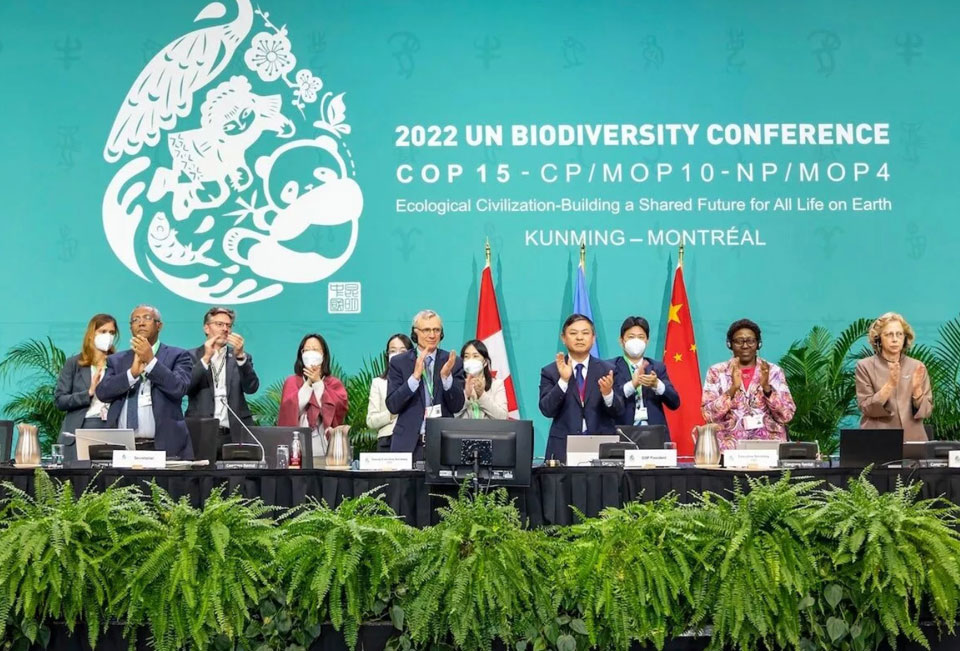
In a landmark deal for the protection of nature, nations meeting at the COP15 UN Biodiversity Conference in Montreal have reached a deal to protect 30 percent of Earth for nature by 2030.
The goal of the Kunming-Montreal Global biodiversity framework is to protect the planet’s rich yet threatened biodiversity. It also includes objectives for the preservation and restoration of ecosystems — like wetlands and rainforests — and for safeguarding Indigenous peoples’ rights.
“Biodiversity is fundamental to human well-being and a healthy planet, and economic prosperity for all people, including for living well in balance and in harmony with Mother Earth, we depend on it for food, medicine, energy, clean air and water, security from natural disasters as well as recreation and cultural inspiration, and it supports all systems of life on earth,” the framework reads.
The agreement aims to preserve genetic diversity and guarantee that nature’s resources, such as plant-based medicines, are equally and equitably shared, BBC News reported.
“We are finally starting to forge a peace pact with nature,” said UN Secretary General António Guterres, as reported by BBC News.
The pact includes the goal of taking swift and drastic action to slow the extinction of species, which has been escalating at an alarming rate.
“An average of around 25 per cent of species in assessed animal and plant groups are threatened, suggesting that around 1 million species already face extinction, many within decades, unless action is taken to reduce the intensity of drivers of biodiversity loss. Without such action, there will be a further acceleration in the global rate of species extinction, which is already at least tens to hundreds of times higher than it has averaged over the past 10 million years,” the framework reads.
The deal also intends to reform $500 billion in subsidies that are harmful to the environment, reported The Guardian.
“It’s a deal with very precise and quantified objectives on pesticides, on reduction of loss of species, on eliminating bad subsidies. We double until 2025 and triple 2030 the finance for biodiversity,” said France’s Minister for Ecological Transition Christophe Béchu, who was the head of its delegation, as The Guardian reported.
The pact was made official by host China, despite an eleventh hour informal objection by the Democratic Republic of the Congo (DRC), which is home to the second largest tropical forest on the planet.
The DRC said it did not support the agreement and that developed countries had a responsibility to provide funding for conservation in developing countries. However, the remarks were not classed as a “formal objection” because those specific words were not used.
The passing of the Kunming-Montreal framework by China’s Minister of Ecology and Environment Huang Runqiu in the face of concerns from the DRC led to some countries denouncing the process as undemocratic. The framework is not legally binding and depends on the countries who are party to it exercising trust and goodwill.
“Legally, it’s done. Morally, what can I say? It’s over,” said Gabon’s Minister of Water, Forests, the Sea and Environment Lee White at the end of the talks, as reported by The Guardian.
Representative of the International Indigenous Forum on Biodiversity Viviana Figueroa was pleased that the framework appreciated the importance of Indigenous peoples in the preservation of biodiversity.
“For us, it’s like a change of paradigm. They are recognising this important role that was invisible,” Figueroa said, as The Guardian reported.
Canada’s Minister of Environment and Climate Change Steven Guilbeault praised the deal, likening it to the 2015 Paris agreement, a legally binding international treaty to keep global temperatures below two degrees Celsius.
“It is truly a moment that will mark history as Paris did for climate,” said Guilbeault, as reported by BBC News.












Comments